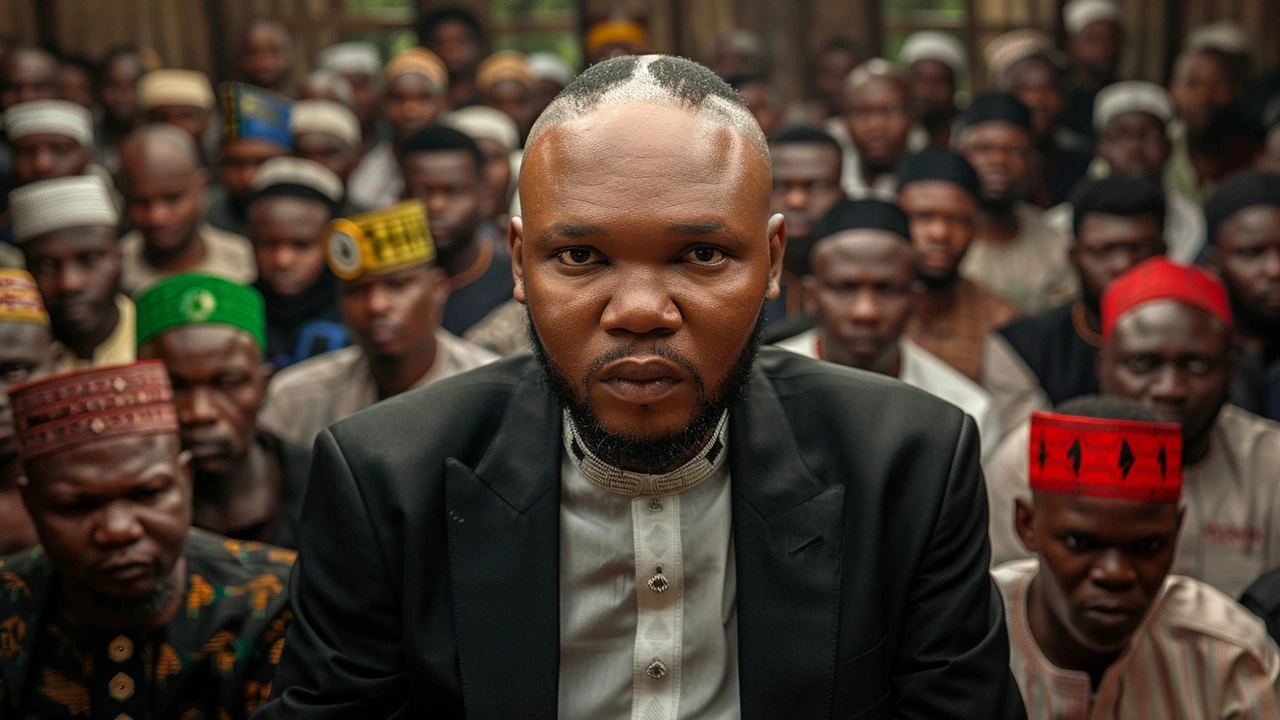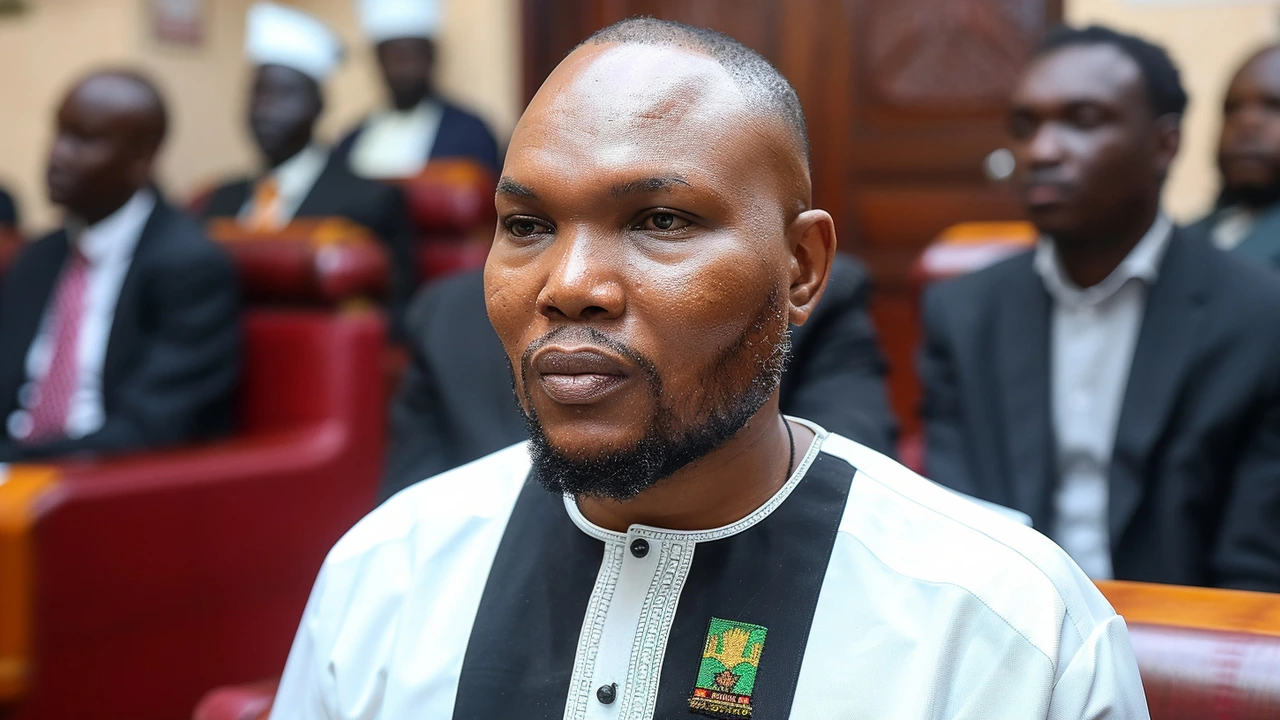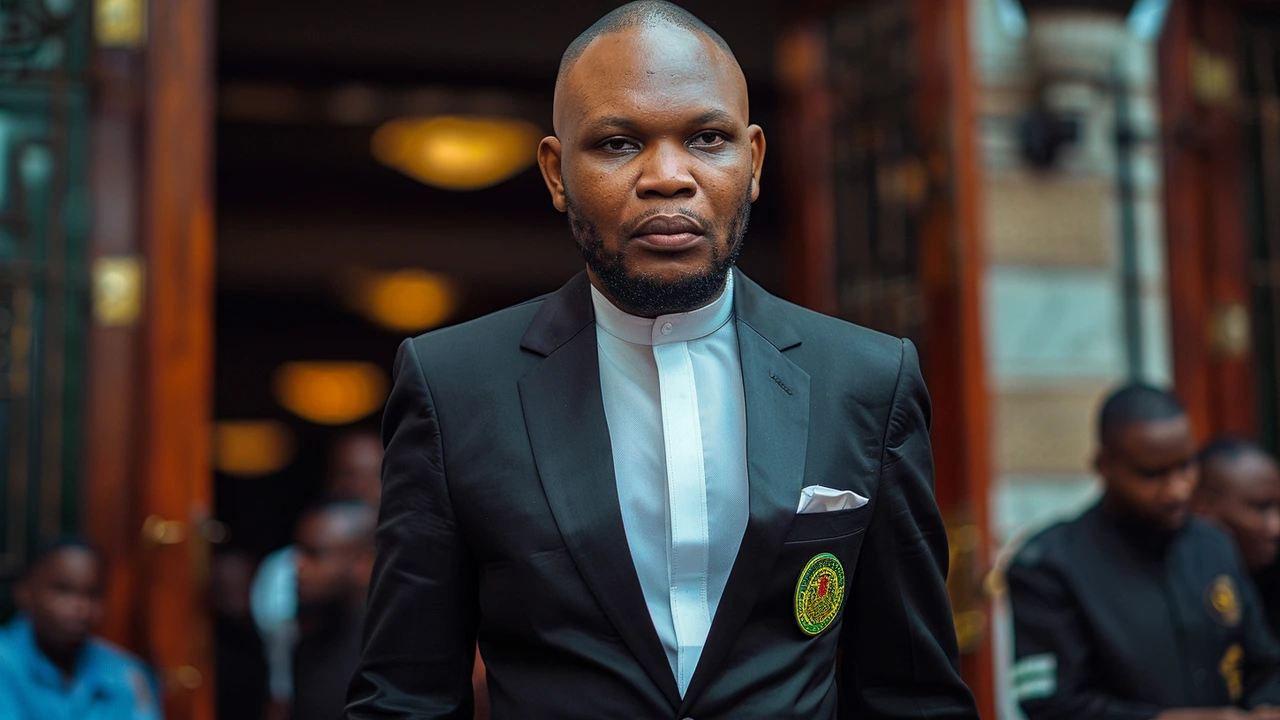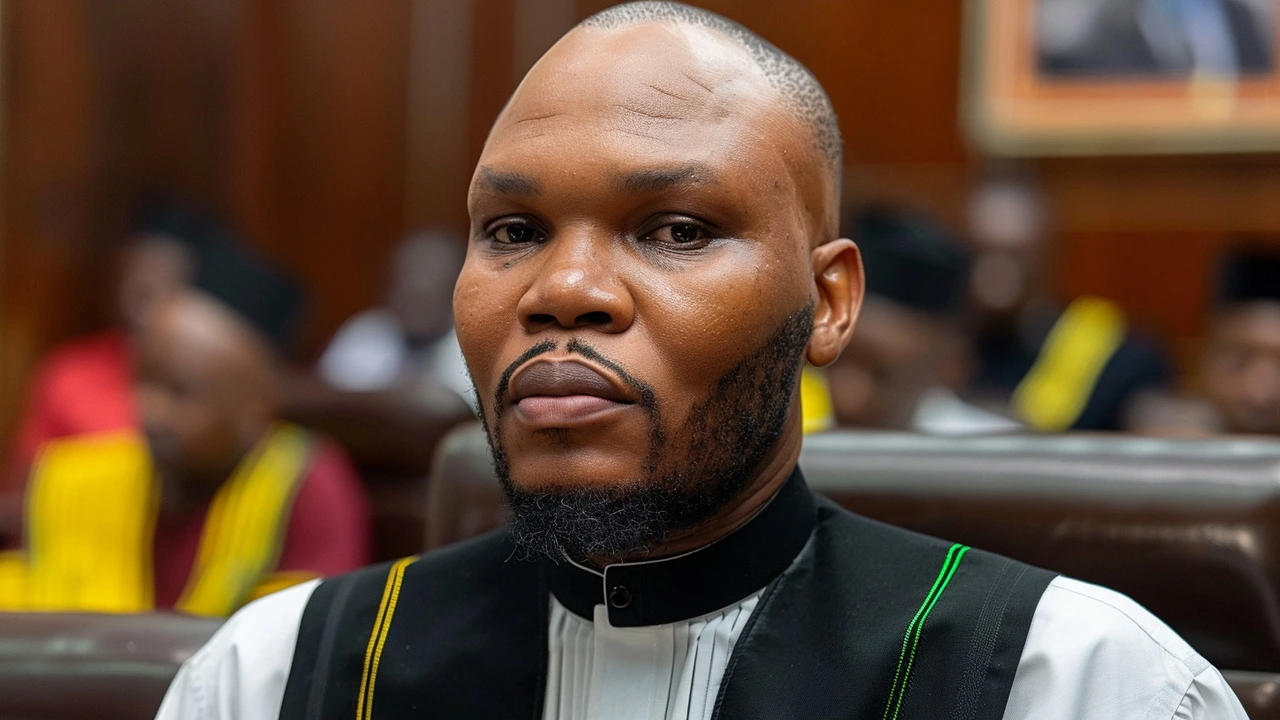Nnamdi Kanu's Legal Team Firmly Rejects ADR for Terrorism Charges
In a highly anticipated court hearing, the legal team of Nnamdi Kanu, the leader of the Indigenous People of Biafra (IPOB), firmly rejected the option of engaging in Alternative Dispute Resolution (ADR) concerning his terrorism charges. This decision has thrown a spotlight on the intricate legal battles and the broader implications for Kanu and the IPOB movement. Led by his adept attorney, Aloy Ejimakor, Kanu's defense stands unwavering in its decision to see the case through in court, foregoing any potential for an out-of-court settlement.

Legal Framework and Constitutional Provisions
Aloy Ejimakor cited specific legal frameworks to support their stance. Sections 17 of the Federal High Court Act and 174 of the 1999 Constitution of Nigeria provide avenues for parties to explore ADR in both civil and criminal matters. Despite these provisions, Ejimakor made it clear that the nature of Kanu's charges and the circumstances surrounding his prosecution render ADR unsuitable. His argument points to the exceptional nature of the case, which he believes warrants judicial scrutiny and a formal trial.
The prosecution, represented by Adegboyega Awomolo, corroborated that no discussions regarding an out-of-court settlement had taken place. Justice Binta Nyako, presiding over the case, acknowledged the clarity brought by both sides on the matter. She reiterated that if the defense team desired to explore ADR, the proper channel would be to approach the Attorney General of the Federation (AGF). Until such a step is taken, the court will proceed with the case as planned.
Dismissal of Applications and Jurisdictional Challenges
In addition to the debate over ADR, the court also dealt with two applications moved by Ejimakor. The filings contended that the court lacked jurisdiction to hear Kanu's case due to potential constitutional violations. However, the court dismissed these applications, underscoring that it retained the authority to preside over the matter. This dismissal paves the way for the case’s continuation, with further hearings scheduled for September 23, 24, and 25.
This phase of the proceedings is crucial, as it will delve deeper into the substantive accusations against Kanu. The trial's outcome could significantly impact the reputation and operations of IPOB, an organization that has been a polarizing entity in Nigeria.

Kanu’s Stance on Insecurity and Violence
Nnamdi Kanu has been vocal about the insecurity plaguing Nigeria’s South Eastern region, expressing his vehement condemnation of acts of violence. He specifically referenced the tragic killing of five soldiers on May 30, an incident that has added to the region's turmoil. In his statements, Kanu stressed that IPOB is founded on principles of brotherly love and does not condone violence. His words aim to distance the movement from any association with aggressive acts, positioning IPOB as a peaceful advocate for the rights and self-determination of the Biafran people.
Kanu’s rejection of violence and emphasis on peace reflect an effort to align the public perception of IPOB with its original mission, counteracting narratives that paint the group in a militant light. This distinction is pivotal, especially as the trial progresses and the spotlight shines brighter on the actions of IPOB and its leadership.
Implications for the IPOB Movement
The rejection of ADR and the push to have Kanu's case thoroughly examined in court highlight the stakes for IPOB. The organization has been at the forefront of secessionist efforts, seeking an independent Biafra state. The trial’s developments could either bolster their cause or present significant setbacks depending on the evidence presented and judicial decisions made. The legal strategies employed by Kanu’s defense will be scrutinized, as they navigate not only legal hurdles but also the court of public opinion.
The situation underscores the broader political and social tensions within Nigeria. The quest for self-determination by regions and groups like IPOB speaks to deeper fractures within the country’s unity. The federal government’s handling of the case, coupled with the judiciary’s role, will be pivotal in shaping future dialogues about regional autonomy and national identity.

Looking Ahead
As the September hearings approach, all eyes will be on the courtroom. The proceedings are expected to be intense, with robust arguments from both sides. For Kanu, this is more than just a legal battle; it represents a critical juncture for the IPOB movement and its aspirations. The outcome could resonate far beyond the legal realm, influencing political dynamics and the future of secessionist movements in Nigeria.
For observers, both within Nigeria and internationally, the trial is a compelling narrative of law, politics, and human rights. It encapsulates the struggles and aspirations of a group fighting for recognition and autonomy, challenged by a state intent on maintaining cohesion and order. The legal journey of Nnamdi Kanu is one to watch, as it unfolds in the coming months.

Roland Baber
June 20, 2024 AT 19:14When we look at the broader legal canvas, the decision to keep the case in court reflects a deep commitment to due process. It also signals to the IPOB base that the struggle is being fought on formal grounds rather than behind closed doors. The defense's stance can be a rallying point for supporters who value procedural integrity. In this context, the court becomes a stage where constitutional principles are tested and possibly reinforced. Ultimately, the outcome will shape how future movements perceive the legitimacy of the judicial system.
Phil Wilson
June 21, 2024 AT 22:00The dismissal of the ADR motion pivots on statutory interpretation of Sections 17 and 174, which delineate procedural admissibility thresholds. By invoking the principle of judicial prerogative, the counsel effectively anchors the doctrine of substantive due process. Moreover, the prosecutorial brief underscores the nexus between terrorism statutes and national security imperatives. This alignment of statutory frameworks with evidentiary standards fortifies the trial's evidentiary architecture. In sum, the procedural trajectory appears calibrated to withstand appellate scrutiny.
Roy Shackelford
June 23, 2024 AT 01:46The whole ADR charade is just another layer of the global agenda to dilute indigenous self‑determination. They want to sideline the Biafran narrative by forcing a back‑channel settlement that never truly exists. It's clear the powers that be are orchestrating a legal smokescreen to keep the movement fragmented. The judiciary is being co‑opted as a tool for geopolitical stability at the expense of rightful autonomy. This pattern repeats across colonial remnants that fear genuine secession.
Karthik Nadig
June 24, 2024 AT 05:33Yo fam, this move to reject mediation is 🚀🔥-they're not gonna let the push for Biafra be watered down by some “alternative” route 😤. The court drama is about to hit another level 📈, and the world will be watching how the establishment tries to keep the flame in check. Keep the spirit alive, stay vigilant 🙏.
Charlotte Hewitt
June 25, 2024 AT 09:20Honestly, it feels like they're just buying time to tighten control while pretending to follow the rulebook.
Jane Vasquez
June 26, 2024 AT 13:06Oh great, another courtroom saga-because nothing says progress like endless legal theatrics 🙄.
Hartwell Moshier
June 27, 2024 AT 16:53They want to keep it in court its a better way
Jay Bould
June 28, 2024 AT 20:40Greetings! It's fascinating to see how the legal strategies intertwine with the cultural aspirations of the Biafran people. This case offers a window into the resilience of a community striving for recognition within a diverse national fabric. I hope the proceedings foster a deeper understanding among all stakeholders.
Mike Malone
June 30, 2024 AT 00:26In the annals of jurisprudence, the refusal to entertain alternative dispute resolution mechanisms in matters of alleged terrorism stands as a testament to the primacy of formal adjudication. The legal counsel's decision underscores a conviction that the legitimacy of the state’s authority must be examined within the established parameters of judicial scrutiny. When a movement such as IPOB articulates grievances rooted in historical disenfranchisement, the courtroom becomes a crucible where narratives of sovereignty, identity, and security converge. It is within this arena that constitutional guarantees are not merely abstract provisions but living safeguards that protect both the individual and the collective. The invocation of Sections 17 of the Federal High Court Act and Section 174 of the 1999 Constitution reflects a nuanced appreciation of procedural safeguards designed to balance state interests with individual rights. By eschewing ADR, the defense signals an intention to challenge the substantive evidence rather than settle for a procedural compromise. This approach invites the judiciary to arbitrate on the very essence of what constitutes terrorism versus legitimate self‑determination. Moreover, the dismissal of jurisdictional challenges reaffirms the court’s confidence in its competency to adjudicate complex political matters. The forthcoming hearings in September promise to illuminate the evidentiary foundations upon which the prosecution relies, thereby offering the public a clearer view of the state’s case. Concurrently, the defense’s perseverance may galvanize supporters, reinforcing the perception that the battle is being fought on an unequivocal legal front. This dynamic has the potential to reshape public opinion, both domestically and internationally, as observers assess the fairness of the process. In a broader sense, the trial serves as a microcosm of Nigeria’s ongoing struggle to reconcile regional aspirations with national unity. The outcome will inevitably ripple through future discourse on federalism, minority rights, and the parameters of lawful dissent. It is, therefore, incumbent upon the judiciary to render a decision that not only addresses the immediate charges but also contributes to the development of a coherent legal doctrine on secessionist movements. Ultimately, the case stands as an opportunity for the legal system to demonstrate its capacity for impartiality, rigor, and respect for constitutional principles. The world will be watching, and the stakes extend far beyond the individual at the centre of the proceedings.
Pierce Smith
July 1, 2024 AT 04:13While the courtroom drama unfolds, it is vital to recognize the human dimensions behind the legal arguments. Both parties claim to act in the best interest of national stability, yet divergent views on sovereignty linger. A balanced dialogue, even within the strict confines of the law, could pave the way for mutual understanding. Constructive engagement may eventually bridge the gap between security concerns and legitimate aspirations for self‑determination.
Abhishek Singh
July 2, 2024 AT 08:00Sure, why not drag it out longer
hg gay
July 3, 2024 AT 11:46Seeing the dedication of the legal team reminds me how important it is to have allies when the system feels overwhelming 🌍. The commitment to a full trial shows respect for due process, and that can inspire many who feel unheard 🙏. Even if the path is fraught with challenges, the perseverance displayed can become a beacon for others seeking justice 🌟. Stay hopeful, keep the conversation alive, and remember that every step forward matters 😊.
Owen Covach
July 4, 2024 AT 15:33Legal fireworks ignite courts bright ideas clash with shadows hope flickers amidst statutes
Pauline HERT
July 5, 2024 AT 19:20The state's refusal to settle is a bold affirmation that sovereignty cannot be bargained away, and any attempt to dilute the cause is a direct affront to rightful self‑governance.
Ron Rementilla
July 6, 2024 AT 23:06The procedural choices made by both counsel reflect deeper strategic calculations about legitimacy and public perception, highlighting how law intertwines with political narratives.
Chand Shahzad
July 8, 2024 AT 02:53Colleagues, let us commend the steadfastness of the defense while encouraging a meticulous examination of evidentiary standards, for the integrity of the judicial process depends on such rigorous scrutiny.
Eduardo Torres
July 9, 2024 AT 06:40Every courtroom session offers a chance to clarify misunderstandings and move toward a resolution that respects both national law and the aspirations of the people.
Emanuel Hantig
July 10, 2024 AT 10:26Indeed, the upcoming hearings could serve as a constructive platform where transparency and dialogue pave the way for sustainable outcomes.